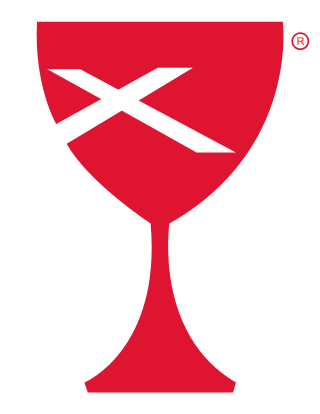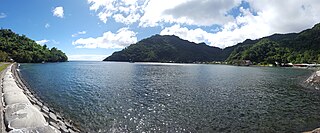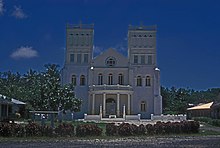
The Christian Church (Disciples of Christ) is a mainline Protestant Christian denomination in the United States and Canada. The denomination started with the Restoration Movement during the Second Great Awakening, first existing during the 19th century as a loose association of churches working towards Christian unity, then slowly forming quasi-denominational structures through missionary societies, regional associations, and an international convention. In 1968, the Disciples of Christ officially adopted a denominational structure at which time a group of churches left to remain nondenominational.

The United Church of Christ (UCC) is a socially liberal mainline Protestant Christian denomination based in the United States, with historical and confessional roots in the Congregational, Restorationist, Continental Reformed, and Lutheran traditions, and with approximately 4,600 churches and 712,000 members.The UCC is a historical continuation of the General Council of Congregational Christian churches founded under the influence of New England Puritanism. Moreover, it also subsumed the third largest Calvinist group in the country, the German Reformed. Notably, its modern members' theological and socio-political stances are often very different from those of its predecessors.

A united church, also called a uniting church, is a denomination formed from the merger or other form of church union of two or more different Protestant Christian denominations, a number of which come from separate and distinct denominational orientations or traditions. Multi-denominationalism, or a multi-denominational church or organization, is a congregation or organization that is affiliated with two or more Christian denominations, whether they be part of the same tradition or from separate and distinct traditions.

The London Missionary Society was an interdenominational evangelical missionary society formed in England in 1795 at the instigation of Welsh Congregationalist minister Edward Williams. It was largely Reformed in outlook, with Congregational missions in Oceania, Africa, and the Americas, although there were also Presbyterians, Methodists, Baptists, and various other Protestants involved. It now forms part of the Council for World Mission.
Protestants in Tuvalu- Tuvalu is one of the most heavily Protestant nations in the world. In 2019, over 92% of the population belonged to a Protestant denomination.

Fagatogo is the downtown area of Pago Pago. Located in the low grounds at the foot of Matafao Peak, it was the location of the first American settlement on Tutuila Island. It includes the sub-village of Malaloa. Today, Fagatogo is the government, commercial, financial, and shipping center of Tutuila. It is also the administrative capital of American Samoa. It is the location of the American Samoa Fono (legislature), and is listed in the Constitution of American Samoa as the territory's official seat of government. Its population is 1,737.

Poloa is a village in American Samoa. It is located at the west side of Tutuila in the Alataua District. The village has 193 residents in 2010. The main denominations in the area are Methodist and Christian. Poloa has one elementary school. It is located in Lealataua County.
The Congregational Christian Church of Tuvalu, commonly the Church of Tuvalu, is a Christian church which is the state church of Tuvalu, although this status merely entitles it to "the privilege of performing special services on major national events"; its adherents comprise about 86% of the 11,600 inhabitants of the archipelago.

Willawong is an outer southern suburb in the City of Brisbane, Queensland, Australia. In the 2016 census, Willawong had a population of 177 people.

The World Communion of Reformed Churches (WCRC) is the largest association of Reformed (Calvinist) churches in the world. It has 230 member denominations in 108 countries, together claiming an estimated 80 million people, thus being the fourth-largest Christian communion in the world after the Catholic Church, Eastern Orthodox Church, and the Anglican Communion. This ecumenical Christian body was formed in June 2010 by the union of the World Alliance of Reformed Churches (WARC) and the Reformed Ecumenical Council (REC).
Vaiee is a small village on the Samoan island of Upolu. It is located on the central south coast of the island. The village has a population of 565.

Tafuna is a village in Tualauta County, Western District, American Samoa. It is the most populous village in American Samoa, with a population of 7,988 according to the 2020 U.S. Census, and is the center of nightlife on island.
The Congregational Christian Church of Niue is a Christian denomination in Niue and New Zealand. It is rooted in the Congregationalist part of the Reformed tradition. It is the largest religious denomination in Niue, claiming approximately 75% of Niue's population as members.
The Congregational Christian Church Samoa (CCCS) is an international evangelical Christian Church originally established in Samoa by missionaries of the London Missionary Society.
The 2007 season of the ASFA Soccer League was the twenty seventh season of association football competition in American Samoa. Konica FC won the championship, their second recorded title, with the winners of the 1998 league competition and a number of previous seasons unknown.
The 2015 OFC U-17 Championship was the 16th edition of the biennial international youth football tournament organized by the Oceania Football Confederation (OFC) for players aged 17 and below. The tournament was held in American Samoa and Samoa from 13 to 26 January 2015.
The South Pacific Association of Theological Schools (SPATS) is an association of theological colleges in the South Pacific. It was founded in 1969 and emphasises ecumenism.
The Reformed Congregational LMS Samoan Church(Samoan: Ekalesia LMS Toefuata'ina Samoa) is a global Christian Denomination based in Samoa, Australia, New Zealand and the United States of America. It traces its origins to Protestant and Congregationalist doctrines, while its core is firmly grounded in the Samoan language, culture, and tradition. The motto of the Church is Fa'afaigofie, Fa'ataugofie, Fa'asa'oloto.

Vatia is a village on Tutuila Island in American Samoa. It is a north shore village located on Vatia Bay. The road to Vatia, American Samoa Highway 006, is the only road going through National Park of American Samoa. Vatia is a scenic community at the foot of Pola Ridge and surrounded by the national park. It is only reached by Route 6 which traverses the national park before reaching Vatia. There was once a hiking trail over Maugaloa Ridge from Leloaloa, but since the completion of Route 6, this trail is now overgrown. It is home to a beach, and panoramic views of jungle-covered peaks surround the village on all sides. Vatia is the center of the Tutuila-section of National Park of American Samoa. It is located in Vaifanua County.

Fagasā is a village in the Eastern District of Tutuila Island in American Samoa. The village lies by Fagasa Bay, on the north shore of the island. Its name is Samoan and translates to "Forbidden Bay." The village borders the Tutuila-section of National Park of American Samoa. The trailhead to Mount ʻAlava is located near the village by Fagasa Pass.











